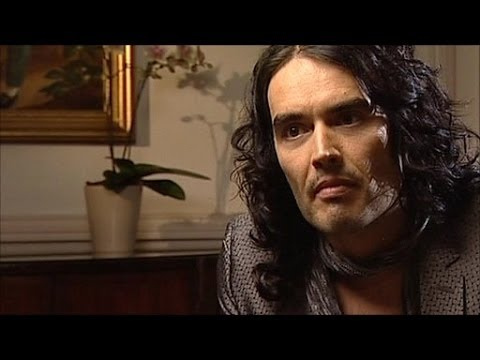In the match between comedian and journalist it was a straight sets victory for the funny guy at the “Who Makes More Political Sense Grand Slam” event near Wimbledon.
Hundreds of thousands have already watched the BBC’s Jeremy Paxman take on Russell Brand in an interview about the need for revolution, a sign that the subject is of more than passing interest.
While it should not be surprising that humour was more effective than earnestness, it was curious to watch how effective Brand’s self-acknowledged ignorance about politics was in scoring political points. Perhaps it was because it made him seem more like the vast majority of ordinary people who know that something is wrong with our economic and political system, but can’t articulate an alternative.
Brand hit an ace when challenged about how he would do things differently and responded by saying what the system shouldn’t do. It “shouldn’t destroy the planet and shouldn’t create massive economic disparity,” he said.
In those ten words he brought together the most important political issues facing humanity today. And they share common roots: Power. Or the lack there of.
Both growing income inequality and the inability to deal with our looming environmental crisis are a result of the concentration of economic and social power in the hands of fewer and fewer people.
In our one dollar, one vote economic system that power inevitably becomes political power. In every system throughout history economic and social power always became political power (then military power).
If left unrestrained, those with more economic, social and political power will use it to get themselves an even larger share of the economic pie, regardless of the effect on the environment or other people. That’s how the system works.
So, money is power, but it is also a result of power. More money, more power, more money, more power — a virtuous cycle if you are among the wealthiest 1%, but a vicious cycle if you belong to the 99%.
This concentration of power in the hands of the few is the enemy of democracy, which is why so many people are concerned about rising income inequality. But it is also the source of the powerful resistance to dealing with global warming and other looming environmental catastrophes. Oil and coal, for example, make money for powerful people.
Once this reality is understood the question of what to do about the problem of growing income inequality and fixing our environment needs to be reframed as: What can we do to fix the inequality of power?
Answers in the past have included: High taxes on high incomes (up to 90 per cent in many countries); Inheritance taxes on the wealthy; Taxes on all forms of property; Nationalizing sectors of the economy to bring them under “public” control; Encouraging the growth of unions. Most people call this package of policies Keynesianism.
All of these measures do reduce the power of the very rich and have in fact worked well for ordinary people in many countries. Prosperity was the result. The gap between rich and poor shrunk. And capitalism survived, despite protestations of the wealthy and their sycophants.
Capitalists survived so well that they eventually reversed many of these reforms. They demanded and won drastic cuts in their taxes, the privatization of nationalized industries and the destruction of unions. Even in most of the countries that once proclaimed themselves socialist or communist, capitalism has returned. New capitalist classes have emerged. The result has been growing inequality.
Is this return to the past proof that capitalism and inequality are inevitable? Just the way things are? That capitalism is natural or god-ordained? That we like it? That the economic elite is better than the rest of us and deserve what they get? Or is there a better explanation?
These are questions that I would have liked to hear Russell Brand answer. And here is my suggestion for what he should say:
Minority rule is what makes growing inequality inevitable. A system can proclaim itself democratic, but if a minority holds most of the economic and therefore social and political power the result will be the same: The minority will inevitably reward itself, its power will grow and ever-expanding inequality will result.
So we are back to the question of power and how to distribute it equally. The answer is more democracy. Real democracy. Economic democracy. Workplace democracy. Social democracy as it was originally conceived.
We need to experiment to find the best ways to have workers and communities democratically administer the economy, to look after our environment. We need multiple owning communities so that power doesn’t become concentrated in the hands of a central state. We need to eliminate the divide between workers and owners by making everyone an owner. Everyplace where social labour occurs — people working in coordination with others — must be governed by democratic principles. We must get rid of incentives to destroy the planet.
That’s the sort of revolution that I think Russell Brand was talking about.
Gary Engler, a longtime Vancouver journalist and union activist, is a co-author of the just released New Commune-ist Manifesto — Workers of the World It Really is Time to Unite, an updating of the original designed to provoke discussion about the future of unions and the Left. The Vancouver book launch is 7:00 p.m. November 7 at the Public Library, main branch.



